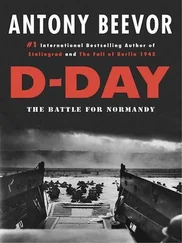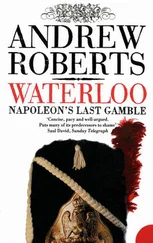Napoleon himself, escorted by a small staff and even smaller bodyguard, got back to Le Caillou, where he discovered the 1st Battalion of the 1st Chasseurs of the Guard, which accompanied him on the road back to Charleroi and eventually to Paris.
One month after Waterloo, Napoleon surrendered to the Royal Navy man-of-war HMS Bellerophon, and was transported first to Plymouth and then to exile on St Helena, where he remained for the almost six years that remained to him before his death in May 1821.
As the good luck of a dedicated journal-keeper would have it, Ensign Gronow was present at La Belle Alliance, the inn that had been behind Napoleon’s lines at the start of the battle, when Blücher met Wellington there at 9 p.m. ‘The Duke of Wellington, who had given rendezvous to Blücher at this spot, then rode up, and the two victorious generals shook hands in the most cordial and friendly manner,’he recorded. 10Speaking the only language both understood, that of their defeated foe, Blücher said to Wellington: ‘ Quelle affaire!’, which might colloquially be translated as ‘What a business!’, or — even more colloquially — ‘Wow!’ With that superbly understated punchline, the ‘long’ eighteenth century could finally be brought to a close.
CONCLUSION
THE WATERLOO CAMPAIGN, like almost any military engagement, was compounded of strategic and tactical errors on both sides, including serious communications and intelligence blunders, tragic friendly-fire incidents, and occasionally an indictable lack of initiative. Few but the Emperor’s most chauvinistic acolytes will deny that many more mistakes, both in quantity and gravity, were made by the French side than by the Anglo-Allied-Prussian coalition.
Wellington, it is true, was caught largely unawares by Napoleon’s incredibly swift deployment of the Armée du Nord. He was, by his own admission, ‘humbugged’. It is on balance unfair to criticise Wellington for leaving his army too widely dispersed before Napoleon attacked, since he had a huge area of operations to patrol and did not know where that attack might fall — or even if Brussels, rather than, say, the Channel ports was in fact the Emperor’s prime objective. (He also had a duty to protect Louis XVIII’s exiled court in Ghent.)
Yet Wellington’s immediate troop dispersals after he had coherent and trustworthy word that Napoleon was on the offensive have been very severely criticised, particularly in recent works by the historian Peter Hofschröer. It is also undeniable that in a despatch written at 10.30 a.m. on 16 june — the day of Ligny and Quatre Bras — Wellington misled Blücher about the exact position of some of his troops. Other historians such as Jac Weiler and John Ropes argue that this was unintentional and the result of the ‘muddle’of Wellington’s Quartermaster-General Colonel Sir William De Lancey, whose papers were subsequently lost after he was mortally wounded at Waterloo. 1It is difficult to accept that Wellington misled his ally on purpose, but this debate will doubtless continue. Nor is the blame all one-sided: the intelligence that Gneisenau and Zieten gave Wellington has been described by one distinguished historian of the campaign as ‘incomplete and late’. 2
The criticism made of Wellington that at such a crucial moment as the evening of 15 June he went to the Duchess of Richmond’s ball is more easily dealt with. By attending — if only relatively briefly — he calmed the fears of the Brussels populace, put heart into his assembled colonels, showed that Sir Francis Drake was not the only British hero to display insouciance in the face of danger, and lost little by it, since not much serious fighting — perhaps 3,000 casualties incurred by the French and the Prussians — had taken place that day.
The accusation that Wellington left too many troops at Hal, covering an attack from Napoleon that never transpired, does not fully take into account Napoleon’s track record, something that Wellington took great pains never to underestimate. Among several other French historians, General Jomini argued that Napoleon should indeed have chosen the more open route to Brussels via Möns, employing wide circling movements on the extreme left flank, not least to avoid the bottleneck before the Forest of Soignes. By the time it was clear that Napoleon had no extra troops to effect this it was far too late to bring the Hal detachment over to Waterloo, even supposing that Wellington had not intended them to help cover his retreat to Ostend were he defeated. 3It was an error of Napoleon’s — one attested to by Soult, Reille, Foy and indeed Wellington himself — to have adopted the frontal assault tactic at Waterloo, but, crucially, it was not one that Wellington could have known was going to be made. Hence, Hal was an acceptable insurance policy.
Both General Picton and Napoleon criticised Wellington’s choice of battlefield at Waterloo, but few have agreed with them. The folds in the ground, the east-west lateral Ohain road hidden from enemy view, the advanced farmhouses and flanking woodland made the battlefield ideal for the kind of dogged infantry and artillery defensive action that the British army excelled at and in which Wellington was expert. A visit to the battlefield itself — which I very heartily recommend to any reader of this book — will, especially if one has the energy to climb the Lion Mound, immediately allow one to appreciate its advantages to the defender. (It should be recalled that Picton only saw one part of the battlefield, and died before he had a chance to appreciate the rest, and that Napoleon had his own bitter and political personal reasons for criticising Wellington’s displacements.)
The loss of La Haye Sainte has also been put down to Wellington’s not supervising the resupply of ammunition to Baring’s 2nd Light Battalion of the King’s German Legion, who fought with rifles rather than standard-issue muskets and therefore needed specialised powder and shot. The wagon that carried the battalion’s ammunition had overturned in a ditch, but it was surely up to Baring rather than the commander-in-chief to see to its rescue.
By contrast with these relatively footling complaints, the errors made by Napoleon and other French commanders during the Waterloo campaign were severe, indeed perhaps even decisive. The first blunder might simply have been for Napoleon to have quitted Elba at all, considering the unanimity of European opinion about his unfitness for the throne and therefore the inevitable invasions of France that it would trigger. Yet his own destiny was always more important to Napoleon than the thousands — and finally millions — of lives that were lost in the course of his pursuit of it.
The Emperor’s next error, at least so Wellington believed, was to have struck north and fought on coalition territory rather than fighting defensively inside France. Some of Napoleon’s best victories had been won with relatively small forces in 1814, and the border fortresses of France could have held up large numbers of coalition soldiers for months. Instead Napoleon was impelled by the political advantages he felt would accrue from a restoration of la Gloire and a magnificent entry into Brussels.
Although Ney has been criticised for not capturing Quatre Bras early on 16 lune, there is some debate about exactly when Napoleon actually ordered him to do so. This has been gready complicated by the ex-Emperor’s almost complete inability when in exile on St Helena to tell the truth about anything much regarding the campaign. 4His zeal in laying the entire blame for his defeat on Ney, d’Erlon, Grouchy and several others — none of whom was admittedly guiltless — led him to play very fast and loose with the facts. Over Quatre Bras, for example, he claimed that he had ordered Ney to capture the crossroads at dawn, whereas twenty years later Ney’s son published the actual orders which showed that of the three instructions Ney received, the first did not mention Quatre Bras and the one that did was written several miles away, at Fleurus, at about 10 a.m. Indeed, Weiler goes so far as to state of Ney: ‘That he began his battle as soon as he did is probably to his credit.’ 5
Читать дальше
Конец ознакомительного отрывка
Купить книгу











